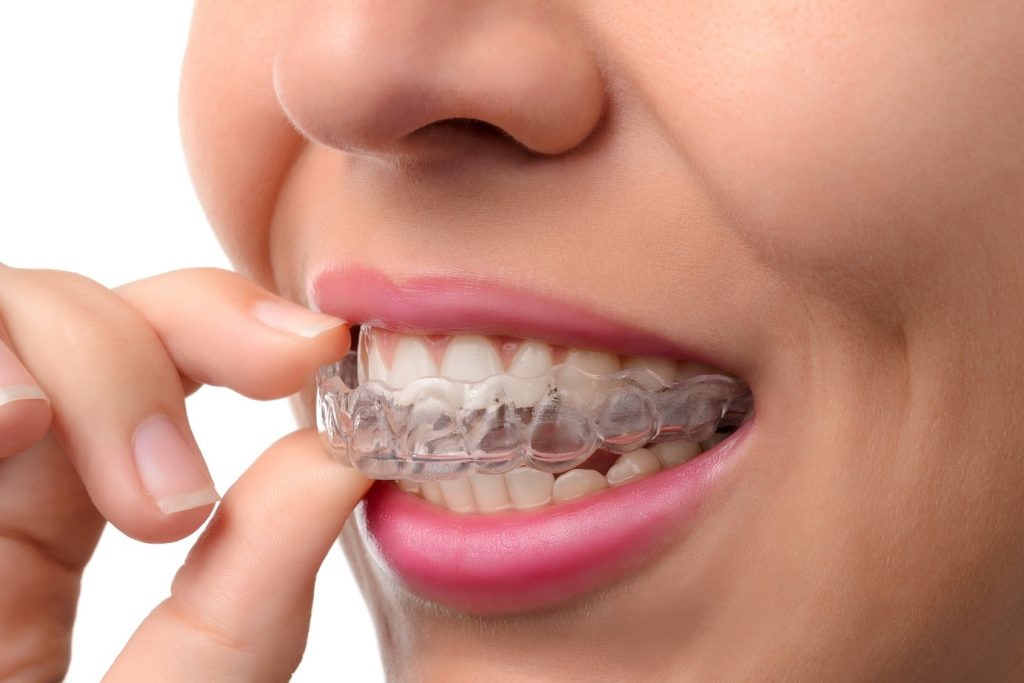Nightguards
Have you ever woken up with a headache or jaw soreness? If so, you may suffer from bruxism. According to the American Dental Association, between ten and fifteen percent of adults suffer from bruxism, or teeth grinding and clenching. While this can occur any time the individual is under stress, it primarily occurs while the individual is sleeping. Unfortunately, this can lead to unnatural enamel wear, chips, cracks and other damage to your teeth, as well as jaw soreness, headaches, poor sleep and much more. When you tell your dentist this is occurring, or he suspects this is occurring based on visible evidence he sees in your mouth, your dentist may recommend that you wear a nightguard.

Understanding Nightguards
Nightguards, which are also known as occlusal guards, occlusal splints or bite splints, are dental devices that are placed over your teeth in order to help protect your teeth. They are not designed to actually stop you from clenching or grinding your teeth, but they can protect your teeth from the damages that are caused by clenching and grinding and help to rest your jaw, which can improve the quality of your sleep.
Nightguards are usually made out of plastic, and can be designed to wear over the top teeth, the bottom teeth or both, though they are most commonly worn over the top teeth. They are custom-designed for you in a dental laboratory using impressions that are made in the dentist’s office, and they are made in such a way as to permit you to breathe easily and speak normally.
Though nightguards can feel odd and may take some getting used to, they should not hurt. Stock nightguards that are made along a “one-size-fits-all” pattern may be bulky, uncomfortable and even painful. Boil-and-bite nightguards, which are meant to be more custom-fitting than stock nightguards, can still be bulky, uncomfortable and even painful. In both these situations your nightguard could cause more trouble than it solves by keeping you up at night. Custom nightguards are more expensive, but they are less costly than the crowns, veneers, bridges, implants, extractions and root canals that are sometimes necessary to repair teeth that have been worn or damaged by clenching and grinding. This is why a custom nightguard is truly the only option to consider, and why you should immediately report to your dentist any discomfort or pain you experience so they can adjust your nightguard as necessary. Your dentist may recommend that you start by wearing it for a few hours while you are awake, so that you get used to the feel prior to sleeping with it in.
In addition to wearing a custom nightguard at night, your dentist may also make some recommendations that can help to reduce the frequency and intensity of your teeth clenching and grinding. This may include limiting caffeine and alcohol consumption, reducing or eliminating your smoking–especially just before bedtime, and participating in relaxing activities like a warm bath, yoga or listening to gentle music before bedtime.
The Benefits of a Nightguard
Wearing a well-fitting, custom nightguard can help you to protect your teeth, get a good night’s sleep, and avoid morning headaches and jaw aches. Bruxism is actually a leading cause of root canals, because the rate of wear to the enamel is far more than normal and there can be as much as forty minutes of massive force from jaw clenching each hour, compared to a normal total of about twenty minutes during the entire day. In some cases, nightguards may even be able to help to lessen or entirely prevent the symptoms of temporo-mandibular joint disorder, or TMJ. Well cared for, a nightguard can last for up to ten years, making it a very worthwhile investment.
For more information about nightguards, contact Dr. Nurminsky today.

